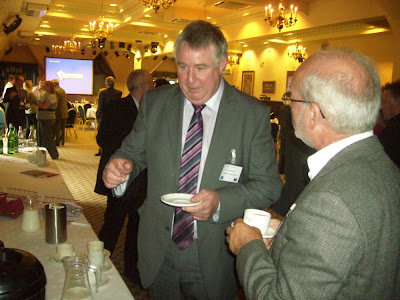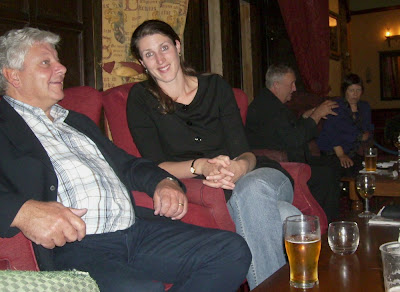Dutch version‘SMART NETWORK SOCIETY’
In Vital Rural Area, Northeast Fryslân region
Sent to the project partners in Work package 3 of Vital Rural Area, but here in this blog for the world:The Province of Fryslân, the Internet Academy and Kabel Noord present their proposals for Work Package 3 of Vital Rural Area. This is a common initiative of these three organisations – from here on indicated as ‘the writers’. The goal of this proposal is to interact and add value to the WP3 proposal of the NOFA-municipalities.
Summary
The writers propose a cluster of interrelated projects. These are all part of an interactive platform which connects users, civilians, suppliers of services. These project interconnect with innovative technologies, as described in the next few paragraphs. Most of these are based on Web 2.0 and IP-technology. The real challenge lies in the participation of citizens, in the change of work processes and in the way of thinking of service suppliers.
Ambitions and innovative aspects
All work package partners have executed a desk research and a field research. The final report of this research has recently been distributed among the WP3 partners by the NOFA programme management. The results and analysis for the NOFA-region indicate that there is a problem concerning the availability and quality of commercial and non-commercial services in this rural region. Every imaginable solution will have to be founded on the aforementioned research analysis.
The writers are certain that improvements are possible. To make this happen, the use of ICT, broadband internet and Web 2.0 applications will have to be considered (see paragraph on technologies). Potentially, these are crucial tools to improve wellbeing and the quality of life, as long as these implementations and developments are socially, not technologically oriented.
Therefore, we think that the real innovative aspect of the proposed projects lies in the combination, integration and interaction of these technologies and in embedding them successfully into all layers of society.
Exemplary for these innovative aspects might be the formation and further development of virtual communities, as well as the search for local support. This support should be found with the potential customers for the services, but should also come from the suppliers and providers of housing, care, health, governmental, and welfare services themselves.
Partners
The main project partner will be the province of Fryslân. The provincial consortium will be completed by sub-partners from the region, e.g. the NOFA-co-operative, local municipalities, local housing corporations, home care institutions, hospitals, health professionals, technology specialists, citizen groups, village boards, et cetera.
Technologies
A number of technologies are already proven. These are presently freely available:
• Protocols - IP, HTTP, SIP, H323, SMS, PtP;
• Development models - Open Source and internet driven applications;
• Virtual developments - Web 2.0, Social Media and websites, Gaming, Virtual Communities;
• Hardware platforms – Broadcast television, PC’s, netbooks, IPTV-set top boxes, embedded PC-devices, touch screen devices, videophones, virtual service desks;
• Hardware platforms – glass fibre, cable & ADSL, satellite, wireless and cellular mobile internet access.
Projects
The writers propose a choice or mix out of some of the projects mentioned hereafter. Maintaining mobility, continuation of primary service supply and community co-operation, these are the buzz words.
The writers see the welfare, care and health sectors as primary co-operation partners.
Self help
The local rural communities must be enabled to help themselves:
Interactive neighbourly help, like the trading of favours and little jobs (transportation, shopping, gardening, cleaning, computer assistance).
Web 2.0 websites, dedicated to the village, will be the carriers of the virtual market places.
A web- and GPS-based public transport following system, coupled to tuk-tuk projects, used, driven and exploited by villagers.
Serious versus entertaining
Interaction and bundling of ‘fun’ services and ‘serious’ services promise to be corner stones of a healthy exploitation and implementation. The fun parts may well be able to provide the necessary funding for the less ‘funny’ departments of the virtual portals.
So a virtual service desk may be accompanied – or even enhanced - by a digital cinema for the younger village population.
Supplier bundling
To be developed and implemented: co-operative portals for the supply of and access to home care services, health services, housing services, municipal services, commercial services (banks, post office, library, shopping list, virtual working place). These portals should be partly physical (‘Kulturhuse’, Village Centres ‘2.0’, multi-functional centres), partly virtual.
Training and instruction
Not one of the above mentioned projects will be able to fly independently without proper training and instruction of certain professional and population groups.
The self help aspect is crucial, so village volunteers will have to come forward.
Also, on the professional side, the suppliers/providers of virtual services will have to alter their back office processes, sometimes even their way of thinking.
Training programmes will have to be developed and provided.
Actual projects
The writers are planning to conceive a master project called ‘Smart Network Society’. They’ll propose series of sub-projects, all related to the main plan.
The Smart Network Society will be the pilot for further implementation and upgrading. Content, pilot groups and geographical scope will have to be well defined. Once up and running, this definition of scope will have to be continuated and refined. Regular periodic field consultation is important, to make sure the projects are still being supported by the region.
International co-operation
This work package is part of an European funded project. International co-operation and knowledge exchange are very important. The writers invite the other three WP3 partner regions to join in the mutual effort to enable services like those mentioned above. Their minds are open to proposals from Denmark, Norway and Belgium.
Financing
Support will be very necessary for the financing of the proposed projects. Of course Vital Rural Area should play its role as instigator and conductor. The regional service providers will be expected to lend financial support too, although this might be more difficult for non-commercial suppliers than for others, like banking institutions or SME’s. Of course it
might be possible to find extra subsidies.
E.g. from:
• Vital Rural Area;
• SenterNovem, health & Care funding by the national Dutch government;
• The Wadden fund, a compensationary fund, dedicated to environment, sustainability and economy;
• The OP Noord, ‘operational programme Noord’, dedicated to innovation and society;
• SIA RAAK, a fund to connect higher education to knowledge demands from the market;
• Additional funding as advised, proposed and supported by the Frisian provincial ICT-Alliance;
• Private funding, e.g. from contractors, sub-contractors, commercial service suppliers.
Gijs van Hesteren, Martijn Ledegang, Max Vijftigschild
Dokkum - Leeuwarden, September 14th, 2009
Also read:
A day of rural imagination
















































